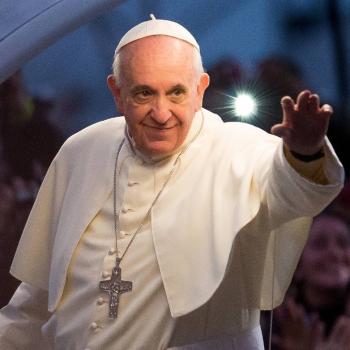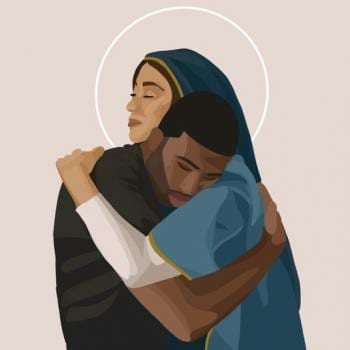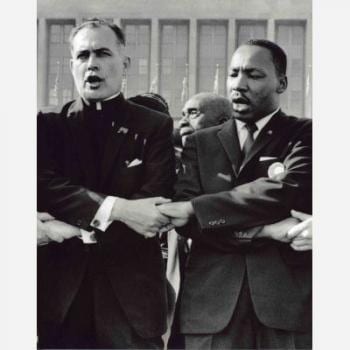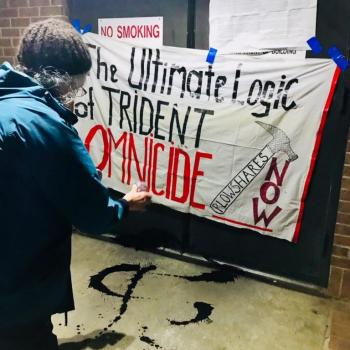[This post is a continuation of Paul Grenier’s dialogue on torture and solidarity. The first part can be found HERE. The previous section concluded with the Professor asking, in Socratic fashion, what motivated the US government to make use of torture after the attacks of Sept. 11.]
AMBASSADOR. I take strong exception to this suspiciousness about America’s motives. Our motives were clear. We were attacked and something had to be done. The correct question to start with is not the motive, but whether or not torture – I still prefer to say enhanced interrogation – was justified under the unique and new circumstances of the global war on terror.
PROFESSOR. Justified in pragmatic terms, or in the sense of just war theory?
AMBASSADOR. Both. I think the enhanced interrogations program was both morally justified and necessary for keeping us safe. Just war theory recognizes that one may not always be able to use just methods in the waging of a war that itself is entirely justified, as this war clearly is. C. S. Lewis somewhere says the same thing. It is unjust, after all, that innocents are inevitably killed during even a careful military assault that tries to avoid civilians. Why wouldn’t even torture, then, sometimes be part of a just war—in other words, a war whose aims are just? And let’s not forget what is at stake here. It is not just our own freedom: it’s also democracy, the rights of women, our very survival!
PROFESSOR. Do you then define a just war as one whose aims are just? Surely you realize that there are other requirements.
AMBASSADOR. Yes, of course there are. If I’m not mistaken, it was Augustine who first declared that a just war has at least three pre-conditions. It has to be openly declared by a legitimate authority. It must be a response to open aggression or a similar just cause. And it should only be fought as a last resort. It’s clear that the U.S. war on terrorism fulfills all of these requirements, including the last. The idea of negotiating with terrorists, after all, is preposterous!
SCIENTIST. [inaudibly to the rest of the group] And because Saddam Hussein was not connected to any terrorists, the U.S. government had to torture a few people into saying that he was …
PROFESSOR. [Knitting his brow and then turning to the Ambassador again] You said earlier that during the waging of a just war, one may be obliged to commit specific acts that are not in themselves completely just. I agree. According to you, however, does this imply that any means at all may be used?
AMBASSADOR. Certainly not. But one’s choice of the means is surely connected with the magnitude of the danger. I can see what you are driving at, though; so let me put the question to you. Where would you set the limits to the violence that is still permissible during a just war?
PROFESSOR. Well, for one thing, I would not fight terror with terror. The firebombing of German and Japanese cities during WWII was intended to terrorize the civilian population of those nations. These were acts of state terror far worse than anything yet perpetrated by any individual terrorist. But I would add to your list of requirements for a just war another requirement that has only in the past hundred years or so come to the fore, at least as far as I know.
I first came across this new requirement in a dramatic dialogue written by the Russian philosopher Vladimir Solovyov, a dialogue called “Three Conversations: War, Progress, and the End of History, plus a short story of the Anti-Christ.”
AMBASSADOR. Vladimir Solovyov! How interesting! I haven’t yet read him, but I have been meaning to, ever since hearing how Cardinal Giacomo Biffi gave a presentation about him to the pope at a retreat a while back. From what I recall, the cardinal, quoting Solovyov, called the Anti-Christ a pacifist, an ecologist and an ecumenist!
PROFESSOR. Is that what he said, truly? How odd. I have always considered Solovyov the patron saint of ecological thought. No doubt what the cardinal meant to say was that no set of values, even the highest, can be a substitute for the living inspiration of the good, which alone can inspire us in the present moment and thereby help us avoid becoming formulaic and rule-bound. But in fairness to Solovyov, you should know that his Anti-Christ, I mean, the Anti-Christ depicted in his story, was a capitalist, an imperialist and a militarist. And he is finally defeated by an ecumenical army.
AMBASSADOR. Well, I haven’t read the story so I couldn’t say. So why again did you bring this Solovyov fellow up?
PROFESSOR. Because he added an important condition to what makes any given war just: namely, that both parties must be at risk. A similar point was made, albeit more weakly, by Yale professor Paul Kahn after the NATO conflict in Kosovo. Kahn found it extremely odd that in a campaign supposedly concerned with the Kosovars’ human rights, it was deemed altogether unacceptable to risk the life of even a singe NATO soldier in saving those same Kosovars. But, Kahn asked, if human rights are about the fundamental equality of all persons as such, how can one justify such obvious discounting of the lives one is supposedly so concerned about? As it turned out, NATO had such complete superiority that it didn’t suffer a single casualty during that campaign.
TALK SHOW HOST. But this makes no sense to me at all! If our enemies are in the middle of some terrible act, such as Serbia’s persecution of the defenseless Kosovars, why is it necessary that we put ourselves at risk for fighting our enemy to become moral? Doesn’t it only add to the sum of evil if our own soldiers are killed, when that might have been easily avoided?
PROFESSOR. You are missing Kahn’s point while shedding light on Solovyov’s. In Kosovo, Kahn said, NATO forces should have been willing to intervene even at the risk of losing some of their own lives if they were truly so committed to the notion that Kosovars are fully human. Kahn said that such willingness to sacrifice on the field of battle is an act of remaking the boundaries of community. It is like Kennedy saying that he too is a Berliner, only this time one would be saying “Kosovar” or “Jew” or “Palestinian,” depending of course on the specifics of the case.
AMBASSADOR. That’s all very well if you are referring to Kosovars, who in this case were entirely innocent …
SCIENTIST. What a bunch of nonsense! And you (turning to the talk show host) say America is free of propaganda!
AMBASSADOR. Or, or at any rate, were substantially more innocent than the Serbians in this case … But it sounds like you are you trying to claim a moral equivalency between the U.S. and its closest allies on the one hand, and our enemies on the other. But that is a complete fallacy. There is no moral equivalency between America and its terrorist enemies or, for that matter, between Israel and its various fanatical foes.
PROFESSOR. But morality is not what I am talking about. Or rather, it is not the only thing I am talking about. And neither was Solovyov. Neither of us would make our decisions about how we fight depend on whether the enemy is more or less ‘good’ than we are. Let us hope that our enemies are always somewhat ‘less good’ than we. But even if a given enemy is utterly barbarian – as were the Nazis during WWII – it changes nothing in one crucial regard. In fact, in Solovyov’s Three Conversations – to be precise it was the first one, called War – this very point is addressed.
In each Conversation, a different character takes the lead and expresses some portion of a larger truth. In the section on war the lead is taken by a Russian General, and he describes the enemy he confronted during one of his campaigns in the Caucasus (this is all taking place during the Russo-Turkic War of the late 19th century) as veritable “devils.” These so-called devils – none of whom are Muslims, Solovyov emphasizes, by the way – are mercenaries from some tribe or other and they have just completed the massacre of an entire Armenian village. They impaled babies on poles and then lit them on fire before the very eyes of their mothers, who were tied to cartwheels and forced to watch. The Cossack regiment commanded by the General gets word that this same detachment of irregulars – which heavily outnumbers them – is on its way to another village where it will certainly do the very same thing. The enemy force had left on horseback an hour earlier and there seemed no way to stop them from succeeding …
TALK SHOW HOST. My goodness, what a story! Has anyone made this into a film yet?
PROFESSOR. Not to my knowledge. Should I tell you how it turns out?
TALK SHOW HOST: Yes! [the others chime in, urging him to continue]
PROFESSOR. Well, the Russian General and his Cossacks come across an old man who had hid in a well during the massacre, and he shows them how to cut off the enemy by taking a little-known route through a narrow mountain gorge. The General and his troops manage to emerge, single file, on the other side of the mountain just in time to set up a few cannons and confront the enemy, the aforementioned ‘devils,’ in battle … Wait, let me correct that. The general first sets his men to mask his three cannons from view and then sends a small detachment of Cossacks on horseback to engage and bait the enemy. Several Cossacks fall, shot by the enemy, but they continue forward until, suddenly, exactly according to plan, they wheel their horses around and beat a hasty retreat. As the Cossack horsemen approach their comrades the General gives the signal: the Cossack horsemen immediately scatter left and right and then all three cannons discharge at once. The surprise effect turns out just as the General had hoped. The enemy flees in disorderly retreat, the Cossacks counter-attack and saber them to the last man!
Now listen. Solovyov, through the General, makes it very clear that had the Turkish irregulars, those so-called devils, continued their charge after the initial cannonade, the Cossacks would themselves have been massacred to the last man. They would never have had the chance to re-load. But instead, the bad guys retreated and the Cossack cavalrymen finish them off. After which of course the Cossacks, whom the general describes as scoundrels, pilfer the dead for anything they can steal. In other words, both sides are morally questionable, but under the circumstances, it was clearly preferable, in the moral sense, that thieving Cossacks should have won, and barbarians who roast babies alive should have been stopped.
AMBASSADOR. Wait a minute. I thought you said the point was all about not making moral comparisons, but now it sounds like this is precisely what you are doing! The Cossacks, though imperfect, were morally superior to those barbaric mercenaries, which is why we are glad that the former and not the latter won the battle. Am I missing something here?
PROFESSOR. Only one thing, and if you will continue listening I will tell you what it is. Even given the extreme barbarity of these irregulars, Solovyov still considered it a condition of justice—in other words, of a just war—that both sides be at risk. If these ‘devils’ had been captured and disarmed, or had been caught in their sleep, it would not have been the same at all. What Solovyov was saying is that human community extends beyond all moral comparisons. Kahn affirmed a community of human equality between the Kosovars and the NATO troops, presumably because he felt that the Kosovars in this situation were in the right. But Solovyov’s logic goes beyond that. Even where, in the moral sense, there is complete inequality between the two sides, universal human solidarity is not negated, because human equality is in the first instance an ontological, and not a moral category.
TALK SHOW HOST. [muttering, though audibly] Once you get these intellectuals talking you can’t make heads or tails of what is going on … What is with this ontological business?
SCIENTIST. Ontology has to do with ‘being.’ It refers to what actually exists, as opposed to what only appears to be. In this case, he is simply referring to what a human is … [turning to the Professor] But please continue!
PROFESSOR. As I was saying, for Solovyov, to be human means ‘to be in solidarity,’ which implies recognizing the infinite value of all human beings regardless of their behavior, even if it is quite bad. His principle that, in a just war, both sides must be at risk stems from recognition of this solidarity as an ontological requirement. So does the principle that one not torture captured prisoners. The prisoner is, by definition, defenseless, which means that the captor is not at risk, even potentially. To deny mercy even here means we are losing the only thing, spiritually speaking, that separates us from devils.
[End of part 2. Stay tuned for part 3.]

















